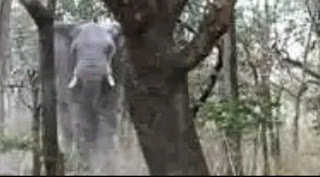A ZIMBIAN WILDLIFE GUILD WHO STOOD IN FRONT OF AGGRESSIVE ELEPHANT HAS RECEIVED PRAISES
A Zambian wildlife guide who stood in front of an
aggressive elephant and commanded it to "get
back" has been widely praised by the British
school pupils he protected.
Footage of Manny Mvula taking on the elephant
who was threatening to charge the group he was
leading has recently been uploaded on to
YouTube.
"My instinct was to run away but Manny's
calming and authoritative presence reassured me
- we figured he knew what he was doing," a pupil
from a secondary school in England told the BBC.
"But for Manny's heroism we could have had a
memorable encounter with this gigantic beast in
more ways than one."
However, Mr Mvula says that his defence of the
students was all in the line of duty.
"I realised I had to do something to stop it
because they were in imminent danger," he told
the BBC.
Remonstrating tone
The unusual standoff happened at the Kasanka
National Park in August when Mr Mvula and a
group of 23 schoolboys aged between 16 and 17
spotted a group of female elephants with their
young in the bush.
Mr Mvula is a trained African wildlife guide
with more than 20 years of experience
After viewing the elephants for some time, Mr
Mvula, 46, and his party set up camp at a
designated spot once the elephants had moved
on.
But they did not know that a bull elephant was
trailing in the wake of the female elephants until
it appeared a few minutes later.
It weighed an estimated five tonnes (787 stone)
and was in the prime of its life at about 40 years
old.
At first it seemed that it too was moving on, but
suddenly it turned and stared at Mr Mvula and
his party.
The trained guide knew immediately that it posed
a danger because he could see fluids coming out
of its temporal glands which were running down
its cheeks - a sure sign that the bull elephant was
in a state of heightened sexual activity called
musth.
"When they are in this condition, they are liable to
charge anything that gets in their way," Mr Mvula
said, "especially if it something or somebody that
they are not certain about."
"I know that standing in front of it and telling it
to go away is not an officially recognised
procedure for dealing with this kind of a
situation," he said.
"But I knew instinctively that it was worth a try
even if there was no guarantee that it would
work.
"I have seen such a technique successfully used
by two other guides and have done in myself
twice previously in such emergency situations."
The guide's remonstrating tone led to the
elephant stopping in its tracks. After a moment's
pause, it opted to make a strategic retreat.
Plan B
"Obviously it was a huge relief," he said, "such an
incident is highly unusual in this part of Zambia."
The elephant had been trailing a group of
female elephants
Mr Mvula - who with his wife runs a responsible
tourism company from their home in the English
county of Kent - has for many years led safaris in
his home country of Zambia.
He said that he had learnt as a professional
safari guide always to have a second plan if the
first does not work.
"But in this case I didn't have many other options
- the only thing I could have done if it didn't back
off would have been to order the boys slowly to
walk back to the truck - parked about 10m (32 ft)
away - while I would run towards it while
swerving in between the trees and swinging my
arms wildly to distract its attention solely
towards me."
The guide said that in the worst case scenario
the elephant could have charged the teenagers,
even though he remained confident that he could
handle the situation successfully.
"That is the importance of always using fully
trained safari guides, who understand animal
behaviour," he said.
"Looking back on what I did, I guess you can say
it was a bit of a stupid thing to do," Mr Mvula
said.
"It took me three weeks to pluck up the courage
and tell my wife what happened."




Comments
Post a Comment